How is everyone unique?
The uniqueness of the individual reflects the questions that one asks. The social sciences — psychology, sociology, economics, political science — are based on the assumption that human beings share common behaviors that can be studied and sometimes even predicted. Psychologists can classify common patterns of behavior as people respond in similar ways to certain situations. Abraham Maslow, for example, posits the existence of a common "hierarchy of needs," ranging from food and security at the most basic to self-actualization at the top. Most or all people will risk everything for the basics of life, but as those are met, they are motivated by goals that bring greater psychological satisfaction. In a similar way, sociologists analyze how different societies act when given certain pressures or opportunities. They observe behaviors and then analyze them to determine underlying patterns that would predict similar behaviors in future situations. Their disciplines are predicated on the assumption that people behave in similar ways under similar situations.
Stories of Individuals
The humanities — religion, history, literature — tell the stories of individuals. Each person or group has experienced the world in a unique way and retains those memories to form a unique perspective. While histories of different people may be similar, the humanities focus on the distinctions of a particular story. The history of the United States may have similarities to that of other nations, but our array of leaders, challenges, opportunities and resources has not exact parallel. It is the challenge of the historian to place the facts of historical development into an account that explains why the nation, state, group or individual developed as it, he or she did. The characters in literature may exhibit characteristics common to all but their stories are the unique creation of the author.
Depending on the goal that one seeks, one can focus on similarities or uniqueness. Educators observe how children at each level of development behave to provide the appropriate challenges and rewards and to develop curricula that those students can master. If there were no common characteristics, it would be very difficult to train teachers. On the other hand, each child comes from a unique background and family and has a unique story. Teachers must be aware of general tendencies based on age and intellectual ability but must also take into account a student's motivation and expectations.
Everyone has a unique story, but we all share common characteristics that define us as human. We are individuals, but at the same time, as members of the human race, react in similar ways to many situations.
How This Source Set is Unique
The first question is based upon an introduction to primary sources (images, documents, artifacts, maps, etc.) that can tell a person's story. The second question is dependent on the students, who will be asked to bring in items of their own that tell their story. Students will share their artifacts with the class in a "Gallery Walk," where they can place their items on the whiteboard ledge with a 0 to 5 years timeline written on the board so that students tell their history from infancy to kindergarten. Each student in the class draws a picture and writes a sentence about their favorite artifact, which can be used to create a class book to be given to each student. For students unable to bring sources, there are two supplementary case studies under the question that can be used instead: Ellen Douglas and William Aossey. The third question is based on what it means to be unique (individual sameness and difference). Students will have the opportunity to compare themselves to other stories through the lens of: family, activities, borrowing and spending choices, scarcity (a lack of something) and transportation/maps.
Supporting Questions
What artifacts help tell a person’s story?
- Birth Certificate of Bessie Bland in New York, ca. 1913 (Document)
- Family Living on Natchez Trace Project near Lexington, Tennessee, March 1936 (Image)
- Geography Lesson at Lakeview Project School in Arkansas, December 1938 (Image)
- Children Playing with Barbie Dolls in the Bronx Borough of New York City, 1970 (Image)
- Children Fishing in Rhode Island along Bonnet Shores, August 20, 1979 (Image)
How is my story unique?
*Students can bring in their own artifacts or teachers can use one of the two case studies.
- If students will bring in their own artifacts, below is some helpful communication to send home.
- Example Letters to send to parents to explain the artifact activity.
- Family Interview Questions
- Case Study 1: The Story of William Aossey
- Case Study 2: The Story of Ellen Douglas
- Ellen and Barbara Douglas in Front of Brucemore Mansion, 1910 (Image)
- Ellen, Barbara and their Nanny Ella McDannel Sitting Outside Brucemore Mansion, 1909 (Image)
- Ellen Douglas and her Sister Barbara Playing at Brucemore in Cedar Rapids, 1911 (Image)
- Ellen and Barbara Douglas on a Sled with their Nanny "Danny," 1910 (Image)
How does my story compare to others?
- Family
- Activities
- Children Jumping Rope, between 1919 and 1921 (Image)
- Nursery School Children on the Playground at Robstown Camp in Texas, January 1942 (Image)
- German Refugee Child Reading a Comic Book, October 1942 (Image)
- Family Builds Snowman While Waiting for Lunch, March 1946 (Image)
- Children Running in Narragansett, Rhode Island, August 28, 1979 (Image)
- Borrowing/Spending
- Little Girl Looking at Book in R.H. Macy and Company Department Store in New York, December 1942 (Image)
- Third-Grade Students Checking Out Books at School Library in New York, June 1943 (Image)
- A "Birdhouse Library" in Cheyenne, Wyoming, July 21, 2015 (Image)
- Child at a Toy Store, Date Unknown (Image)
- Scarcity
- Vegetable Garden At "Beacon Hill House" in Newport, Rhode Island, July 1917 (Image)
- Lumbering in the Cascade Mountains near Seattle, Washington, 1921 (Image)
- Water Faucet by the Packing Sheds in Edison, California, April 1938 (Image)
- Corn Field in Drought near Hillsboro, North Carolina, September 1939 (Image)
- Children Waiting in Line for Water in Yauco, Puerto Rico, January 1942 (Image)
- Rogue River National Forest in Jackson County, Oregon, July 1942 (Image)
- Field of Sweet Corn near Marengo, Iowa, August 8, 2016 (Image)
- Failing Tomato Plant, Date Unknown (Image)
- Transportation/Maps
| Identity Teaching Guide |
| Printable Image and Document Guide |
Birth Certificate of Bessie Bland in New York, ca. 1913
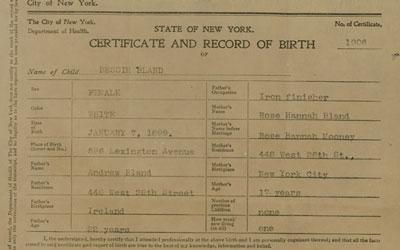
Description
This is a birth certificate for a baby girl named Bessie Bland who was born in New York City. This is the original document with important information about the baby's birth and parents.
Family Living on Natchez Trace Project near Lexington, Tennessee, March 1936
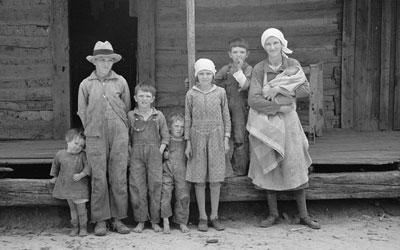
Description
This photograph shows a family living in Lexington, Tennessee, on the Natchez Trace Project near Natchez Trace State Park. The name originally applied to a series of trails and paths that originated with animal migration routes and American Indian trade and travel routes.…
Geography Lesson at Lakeview Project School in Arkansas, December 1938
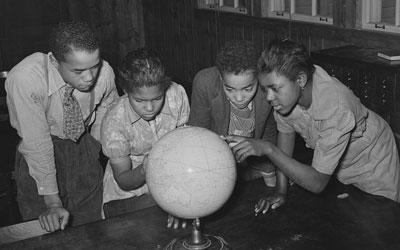
Description
This photograph shows African-American children looking at a globe to find where they live in Arkansas. They are doing this during a geography lesson at Lakeview Project School in 1938.
Children Playing with Barbie Dolls in the Bronx Borough of New York City, 1970
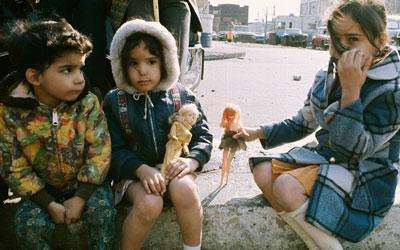
Description
In this photograph, these children are playing with Barbie dolls. The children live in the Bronx, which is the northernmost of the five boroughs of New York City.
Children Fishing in Rhode Island along Bonnet Shores, August 20, 1979
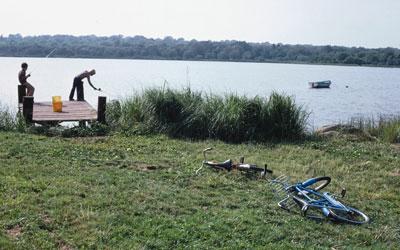
Description
This photograph shows the Hoey children in Rhode Island along Bonnet Shores. The children are shown enjoying fishing, boating and biking.
Map of Syria, Date Unknown
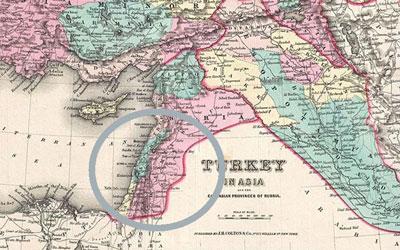
Description
William Aossey's father, Sam, and his uncles, William, Abdoo and Mike, immigrated from Syria-Lebanon, which was then still part of the Ottoman Empire, in 1907 coming through Ellis Island. Settling in the Midwest, his Uncle William led the way for working as peddlers and…
Dedication of Mother Mosque in Cedar Rapids, Iowa, Date Unknown
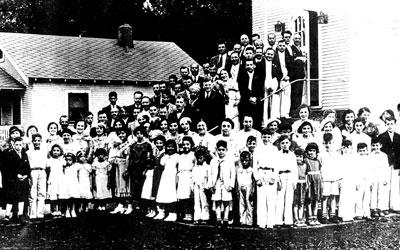
Description
William's family is Muslim. Cedar Rapids, Iowa, is home of the oldest building in the United States built as a mosque, which is a Muslim place of worship. Since 1895, Muslims have immigrated to Cedar Rapids in search of the American dream. William's family and other Muslim…
Aossey Family Horse and Wagon, Date Unknown
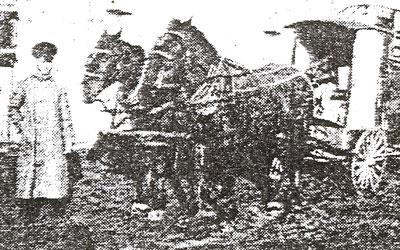
Description
This photograph is of the Aossey family's horse and wagon. William's uncle, William, used this to travel across Iowa as a peddler of goods.
Aossey Family Delivery Truck, Date Unknown
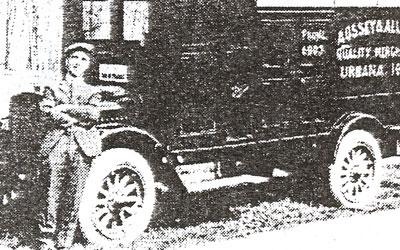
Description
This photograph shows the Aossey family's delivery truck. This truck was important to the family's business of transporting goods.
Ellen and Barbara Douglas in Front of Brucemore Mansion, 1910
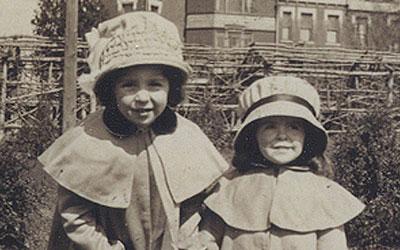
Description
Ellen (left) and Barbara Douglas (right) are pictured in front of their family's mansion, Brucemore, in Cedar Rapids, Iowa. George and Irene Douglas had three daughters. Margaret, the eldest, was born in 1896. Nine years later, her sister Ellen was born. Barbara, the…
Ellen, Barbara and their Nanny Ella McDannel Sitting Outside Brucemore Mansion, 1909
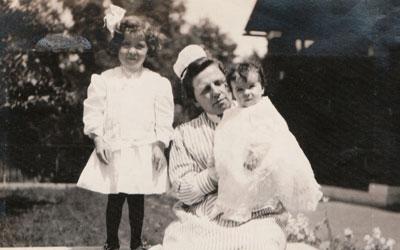
Description
Ellen (standing), Barbara and their nanny, Ella McDannel (also known as "Danny") are shown sitting together near the north side of the mansion. As they grew older, they enjoyed such treats as roller-skating in the hall and playing ping-pong on the dining room table. A…
Ellen Douglas and her Sister Barbara Playing at Brucemore in Cedar Rapids, 1911
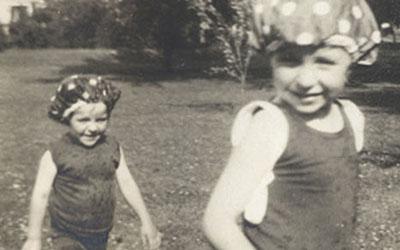
Description
Ellen (front) and her younger sister, Barbara, are playing on their family's estate in their swimsuits. The family lives in Brucemore, an expansive estate, which made for a generous playground for these young girls. Warm afternoons could be spent splashing in the pool,…
Ellen and Barbara Douglas on a Sled with their Nanny "Danny," 1910
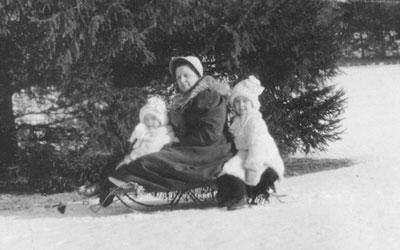
Description
Barbara, Ellen (back of sled) and their nanny, "Danny," are shown on a sled together. In the winter, the children went sledding and skated on the pond. The Douglas family had a large group of people who worked to maintain their house and large estate. Among them, was Ella…
A Chinese Family, between 1898 and 1905
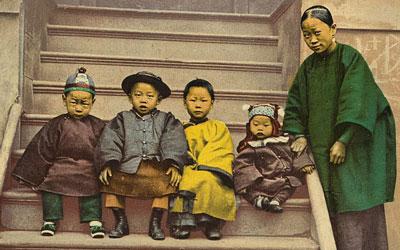
Description
This photograph shows a Chinese family sometime between 1898 and 1905. Four children can be seen on the steps with their mother to the right of them standing.
Sioux Family from Rosebud Indian Reservation in South Dakota, 1910
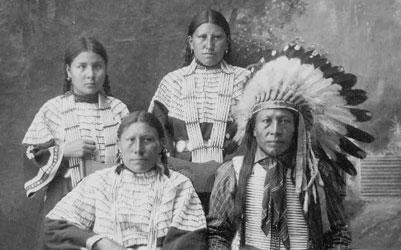
Description
This photograph from 1910 features a Sioux family from Rosebud Indian Reservation in South Dakota.
Russian Family of Refugees Arriving in New York, September 16, 1921
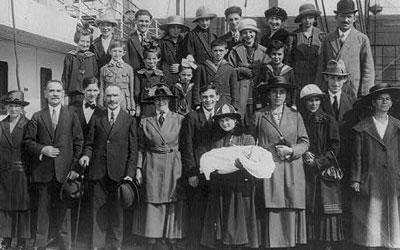
Description
A well-dressed family of 27 Russian (Ostrovski) refugees were photographed on the boat deck upon arrival in New York on Sept. 16, 1921.
Mexican Baby and her Sister in San Antonio, Texas, March 1939
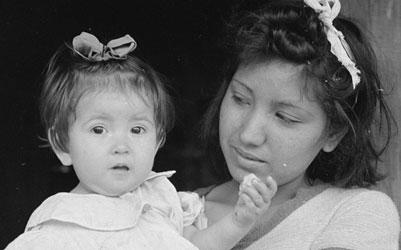
Description
This is a photograph from March 1939 of a Mexican baby being held by her sister in San Antonio, Texas.
Children Jumping Rope, between 1919 and 1921
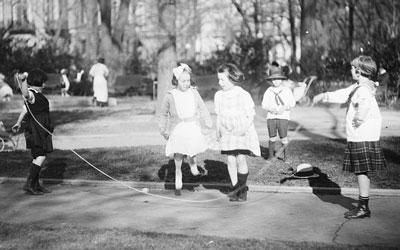
Description
These children are shown jumping rope at the park. This photo was taken sometime between 1919 and 1921.
Nursery School Children on the Playground at Robstown Camp in Texas, January 1942
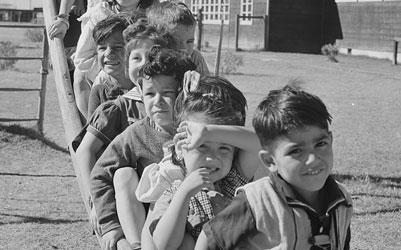
Description
This photo shows nursery school children posing on a slide at their school in Robstown Camp. They lived in the migrant labor camp with their families in Texas.
German Refugee Child Reading a Comic Book, October 1942
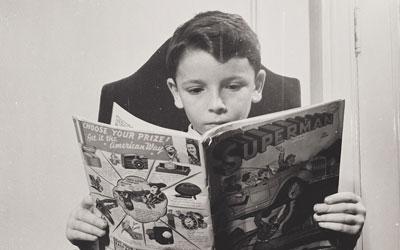
Description
This boy, a German refugee, is reading the comic book, "Superman," in this photograph. The photo was taken in October 1942 during World War II.
Family Builds Snowman While Waiting for Lunch, March 1946
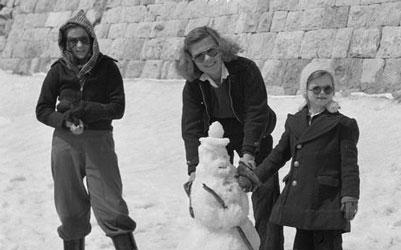
Description
This photo captures a white, American family building a snowman while waiting for lunch in March 1946.
Children Running in Narragansett, Rhode Island, August 28, 1979
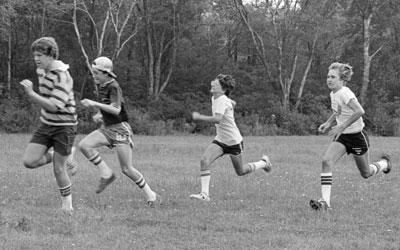
Description
These children are shown running a race in Narragansett, Rhode Island, on Aug. 28, 1979.
Little Girl Looking at Book in R.H. Macy and Company Department Store in New York, December 1942
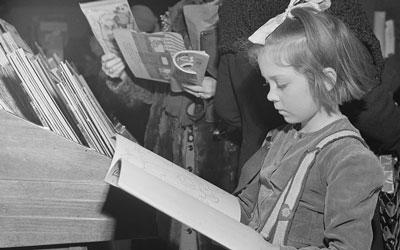
Description
This photo shows a little girl looking at a book at R. H. Macy and Company Department Store during the week before Christmas in 1942.
Third-Grade Students Checking Out Books at School Library in New York, June 1943
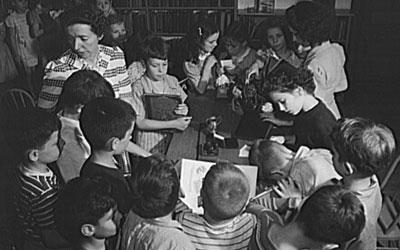
Description
These third-grade students from Elmer Avenue Elementary School in Schenectady, New York, are signing out books from the school library.
A "Birdhouse Library" in Cheyenne, Wyoming, July 21, 2015
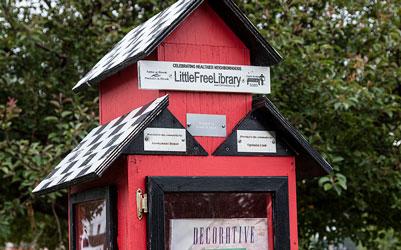
Description
This photo features a "birdhouse library," which is a miniature source for books. Citizens are encouraged to leave books they have finished and help themselves to those that interest them.
Child at a Toy Store, January 17, 2017

Description
This photo shows a child at a toy store as he looks around at the all the toys.
Vegetable Garden At "Beacon Hill House" in Newport, Rhode Island, July 1917
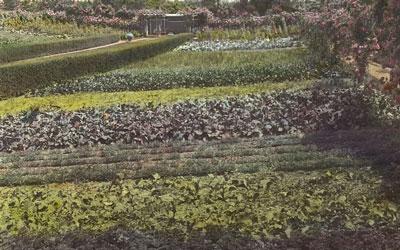
Description
The photograph shows a plentiful vegetable garden at the "Beacon Hill House," also known as Arthur Curtiss James' home, in Newport, Rhode Island.
Lumbering in the Cascade Mountains near Seattle, Washington, 1921
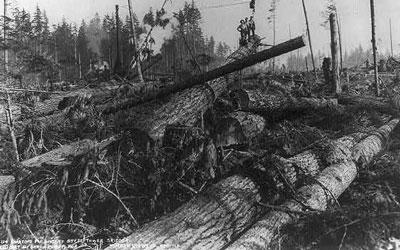
Description
Logging is the cutting of trees and removing of branches so the logs can be made into products. This photograph shows lumbering in the Cascade Mountans near Seattle, Washington.
Water Faucet by the Packing Sheds in Edison, California, April 1938
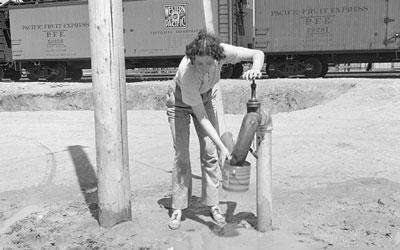
Description
A woman is retrieving water from a faucet by the packing sheds in Edison, California. This faucet is the only source of water for 150 to 200 families camped in the brush waiting for the potato harvest to open in town.
Corn Field in Drought near Hillsboro, North Carolina, September 1939
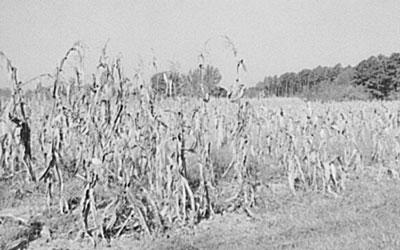
Description
This photo shows a corn crop that is dying because of a drought - lack of rain - in Hillsboro, North Carolina.
Children Waiting in Line for Water in Yauco, Puerto Rico, January 1942
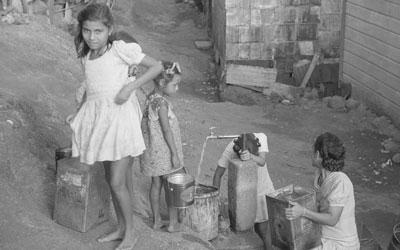
Description
These children are waiting in line for water from the faucet in Yauco, Puerto Rico. The photograph was taken in January 1942.
Rogue River National Forest in Jackson County, Oregon, July 1942
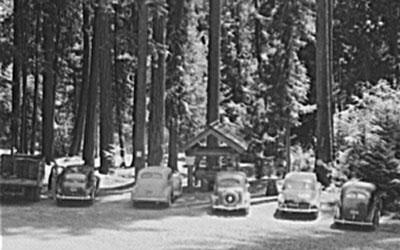
Description
This photograph was taken in July 1942 and shows the Rogue River National Forest in Jackson County, Oregon. The U.S Forest Service has built camps with outdoor ovens, drinking water, sanitary facilities, tables, benches and shelter houses throughout the national forests.…
Field of Sweet Corn near Marengo, Iowa, August 8, 2016
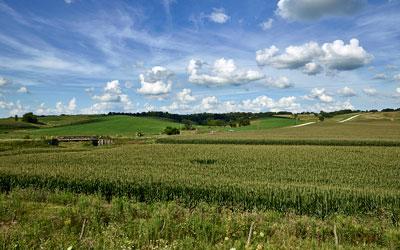
Description
This is a field of sweet corn near Marengo, Iowa, from August 8, 2016.
Failing Tomato Plant, August 18, 2018
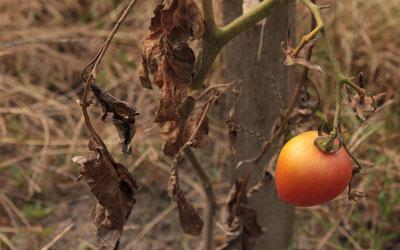
Description
This photo shows a failing tomato plant at a farm on Aug. 18, 2018.
Family Traveling with Donkey and Horse near Sea of Galillee in Palestine, 1895
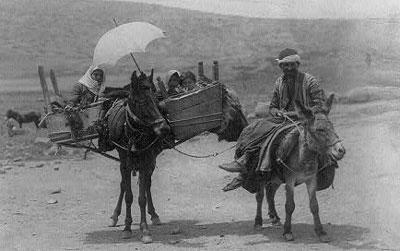
Description
This photograph show a man, woman and two children with a donkey and horse traveling near the Sea of Galillee in Palestine. The photo was taken in 1895.
Russian Children in Front of the Ussuri River in Russia, October 12, 1895
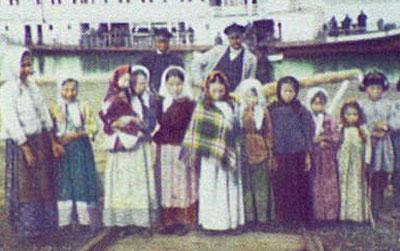
Description
These Russian children and their family are standing in front of steamer boat in the Ussuri River.
Nanai Family on a Dog Sled, November 1895
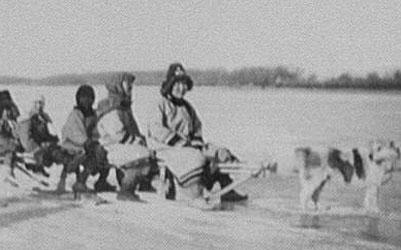
Description
This photo features a Nanai family traveling by a dog sled. They were native to Siberia or northeast Asia. There were many different methods of travel depending on the season. In the winter, the Nanai traveled by either by foot or dog sled.
Boys Sitting on a Truck in Robstown, Texas, January 1942
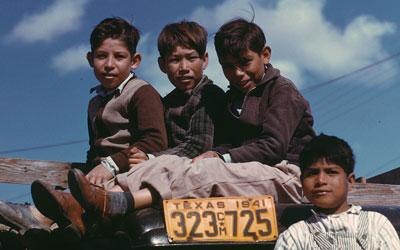
Description
These boys are shown sitting on a truck in Robstown, a migrant labor camp, in Texas. The state was home to several Farm Security Administration camps, where families had access to free medical and dental care, community gardens and nursery schools for young children. …
Additional Resources:
Iowa Core Social Studies Standards (K)
Listed below are the Iowa Core Social Studies content anchor standards that are best reflected in this source set. The content standards applied to this set are elementary-age level and encompass the key disciplines that make up social studies for kindergarten students.
| No. | Standard Description |
| SS.K.6. | Describe students’ roles in different groups of which they are members including their family, school, and community. |
| SS.K.10. | Give examples of choices that are made because of scarcity. |
| SS.K.11. | Explain the difference between buying and borrowing. (21st century skills) |
| SS.K.12. | Distinguish between appropriate spending choices. (21st century skills) |
| SS.K.13. | Create a route to a specific location using maps, globes, and other simple geographic models. |